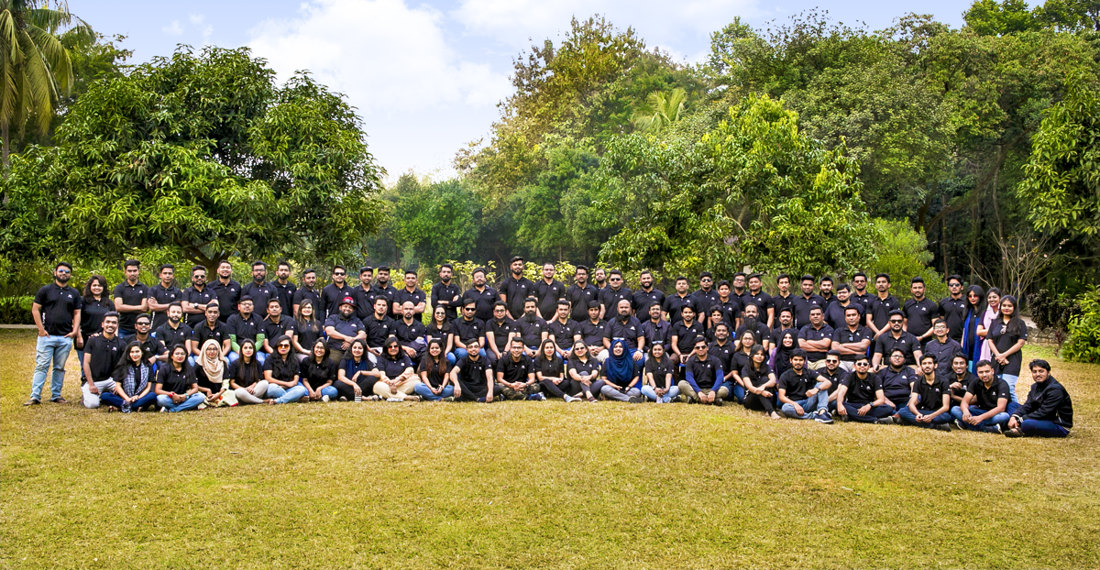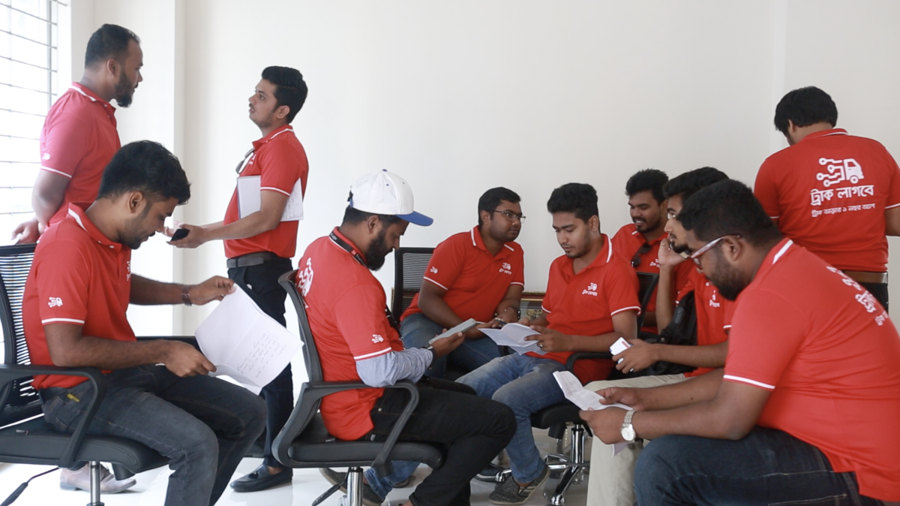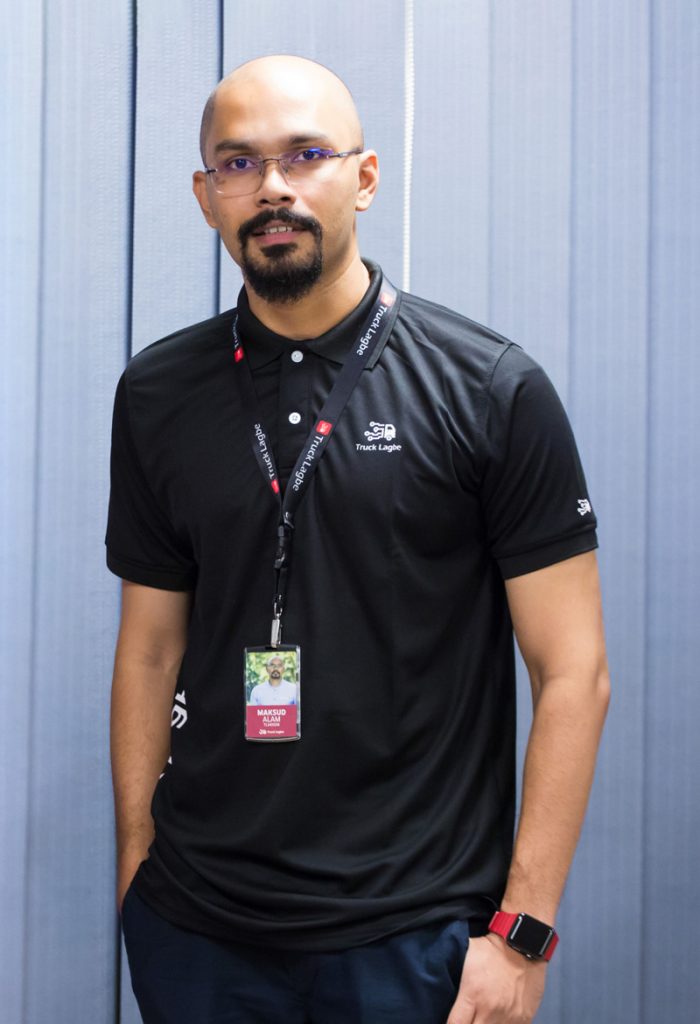
“If you invest in your people, they will grow and if you care for your people, they will care for you and will walk with you and walk for you,” says Maksud Alam Rifat, Director of HR and Culture at Truck Lagbe. Based on that axiom and understanding, digital trucking startup Truck Lagbe has built a culture to attract, retain, and develop top talents to transform one of the most difficult industries in Bangladesh with technology. This story illustrates how Truck Lagbe does it.
Launched in 2017, Truck Lagbe connects truck owners/drivers and shippers via app and web. The service has proven invaluable to the companies, essential good suppliers, and individuals in need of logistics service amid the coronavirus pandemic. The company credits its people for its growth. To that end, Truck Lagbe has invested in its people and created a culture that enables forward motion.
“We have tried to create a people-first culture, a culture of empathy and contribution,” says Mr. Maksud. Mr. Maksud joined Truck Lagbe in 2018 as its first HR hire. Truck Lagbe has since grown as a company.
With the growth of the team, the human resource management has also grown into a separate department. Over these years, the company systematically invested in building processes and structure to create an organizational culture where people perform, deliver results and thrive.
“Since people are the most important resource of our company, it is necessary to have the process and system in place to manage and nurture them,” says Mr. Maksud.
Culture is rarely about rules, it is about people. It is about what people do and how people interact within the organization and with outside stakeholders. To that effect, Truck Lagbe goes the extra length to hire the right people.
“We hire for mindset and cultural fit,” says Mr. Maksud. “We hire both freshers and experienced professionals. We look for people with a growth mindset. Expertise is rarely the most important trait we seek. Rather we value people who are passionate and are interested in learning and personal growth, and contribution.”
Carol Dweck writes in her famous book Mindset: when you have a growth mindset, you see possibility in every challenge. With a fixed mindset, every setback appears an insurmountable challenge and a permanent failure. Truck Lagbe says while it tries to hire the best candidates, it puts greater value on cultural fit over superior qualification and mere talent.
“Even when we find people who are qualified and talented but are not compatible with our mindset and culture, we don't hire them,” says Mr. Maksud.
Truck Lagbe operates in a challenging industry. Trucking as an industry has a negative perception among common people. Without a highly driven team, it naturally would be difficult for Truck Lagbe to break into such a market. An intentional hiring process has allowed the company to put together a motivated team that comes to work every day with a drive to make a difference.
The company has also put together ground rules to help a motivated group of people to move towards the right direction. A human resources management team led by Mr. Maksud works tirelessly to create systems and tools and programs to keep people energetic, motivated and on the right track.
Mr. Maksud explains the philosophy of the HR Team: “the responsibility of every HR team lies with the people of the company, not only with the management. If people don't love the culture and workplace environment, the company will never grow.”
The small HR team, with the help of other relevant teams, looks after all the major human resources management-related works notably payroll management, performance management, hiring, people analytics, and training and development.
Mr. Maksud explains: “HR manages two types of work — operational HR activities and strategic HR activities. On the strategic side: we make the placement decisions for required teams focusing on our hiring philosophy, the salary we want to offer, performance measurement tools, career path designing, working on people feedback, etc.
Every new hire at Truck Lage is shown a career path upon joining the company that highlights how he/she would grow and where he/she would go from here as his/her career grows. It motivates people to push for growth.
On the operational side, HR deals with more practical issues such as hiring, sourcing talents, onboarding, and deciding what kind of impression new hires will get from day one at the company.

Over the years, Truck Lagbe has tried to make hiring systematic, structured, and data-driven. Nothing is based on hunches or activities. Everything begins with a plan. Hiring decisions are need-based. “We hire based on the bandwidth of the current team,” says Mr. Maksud. “If we see that our existing resource is being exhausted or overloaded compared to our growth plan and speed, we go for hiring.”
Hiring plans are made quarterly, except for hires where it needs to be done ASAP, based on the business goal — we want to take our business from here to there and we need new people to achieve that goal.
Outlets for hiring announcements are usually chosen based on positions. Usually, announcements are published on Facebook, Linked In, Job portals, and personal networks.
Once CVs come, they are then screened and analyzed critically based on the demands and requirements of the position. Usually, it takes more than a CV to understand a person. In-person interviews complement overcoming that challenge. CV and interview confirm the profile match. The company also looks for relevant skill sets and experience.
While the company puts enough weight on the CV and interview for initial profile matching, it gives more importance to thoroughly knowing the person through informal conversations. It also tries to understand the mindset and cultural orientation of a person through inquiring about his expectations and previous work.
“In the interviews, we learn about the person outside of work — his hobbies, family life, and so on,” says Mr. Maksud. “We encourage people who have entrepreneurial tendencies and are trying different things. Finally, when it comes to salary negotiation, we try to see whether the person is asking for an unusual salary increase compared to his current salary.”
The company has built a storytelling regimen that it shares with the potential hires to check their level of empathy and whether they will be willing to work with and care for the user group Truck Lagbe serves.
This consistent probing into the character of a person allows the company to find and attract the right talent who owns the job once they finally join the company. It makes the rest of the HR department’s work easier.
But hiring the right people is only a small part of building a great culture. Cultures are like gardens. If you don’t tend and take care regularly, plants die and weeds take over.
To keep the cultural practices vibrant, the company has a series of initiatives. One such initiative is town halls. “We have company-wide town hall meetings every Sunday and the entire company attends these meetings,” says Mr. Maksud. “We discuss everything from business growth, product updates to sharing experiences to challenges, ice-breaking of new joiners, and taking suggestions on various issues from everyone.”
“When companies grow, it gets increasingly hard to know everyone,” says Mr. Maksud. “We try to break that limitation through these town hall introductions.”

Companies grow when their people grow. To that end, every good company takes the growth of its people seriously. Truck Lagbe regularly invests in its people.
“We have two mechanisms for people development: training & development and then regular knowledge-sharing practice,” says Mr. Maksud.
Apart from formal training, Truck Lagbe regularly hosts knowledge sharing sessions — 2-3 open knowledge sharing sessions every month — where people from different teams, from executive to below team lead, take sessions on various topics. These knowledge-sharing sessions are open to all. People share their interest in taking sessions. If no one shows interest, the team selects one through a voting process after every session.
“These sessions help us to engage the team, learn about and from each other, and understand how people think,” says Mr. Maksud. “Pandemic took a toll on this but we are trying to get back to our old days.”
Performance management and people analytics. A key aspect of Truck Lagbe’s people development strategy is performance management and people analytics. Over the years, the company has invested and built a strong performance management process.
One of the key challenges of performance management is quantification. While it is easy to quantify the work of teams like sales and similar target-based departments, it is not so simple for departments like HR, Tech, and similar departments that work on more qualitative sides of things. Truck Lagbe, however, developed a model to address these challenges.
“We have a 360 performance management system with a combination of rating scales,” says Mr. Maksud. “ Individual performance is measured based on three metrics: Individual KPI, Cross-functional collaboration and exercising company values.”
People analytics help the company understand how people are doing in the organization and design interventions accordingly.
The company closely works with people who struggle with performance and help them to improve. This contributes to its healthy retention rate which is around 90%.
Startups often get a questionable rep for poor retention rates. And poor retention rates are not healthy for any company because if you are changing people all the time, it is hard to build a steady operation and grow consistently. That, however, does not mean high retention rates are ideal by themselves.
Mr. Maksud explains: “We have to understand that high retention rates are not essentially a good thing. If our retention rate is 100%, it could mean many things. It could be that our performance is not being monitored regularly, assessments are not done timely or appropriately and many people stay here even if they are not contributing as expected.”
Startups are high-risk and high reward organizations, Mr. Maksud asserts. If people are not delivering then it is a high-risk situation and if you maintain that situation through retention, it means you are risking your company. There is a healthy retention rate which depends on many things and a company should aim for finding that balance.
Truck Lagbe arranges counseling sessions for people who struggle with performance and sometimes with their career plans. The company tries to help them to improve and deal with their challenges. “We try to understand the problem: is it professional, personal, skill or enjoyment of the work or coping with the work, etc,” says Mr. Maksud. “Empathy is important to motivate people. Pressure works but it does not after a certain point. Empathy is endlessly powerful.”
Based on counseling, the company takes measures such as allowing people to change teams and responsibilities, providing specific training for skill development, and short term breaks from work to rest and recuperate.
The company, however, does not tolerate integrity issues and takes immediate action when people break certain redlines as per its HR Policy and Guidelines.
“We support people who are willing to learn, trying but failing,” says Mr. Maksud. “We even like people who try and fail. We appreciate making mistakes and trying new ideas.”
The company has an open culture to deliver and receive feedback which encourages people to challenge each other including its senior leaders.
“The features you see in the Truck Lagbe app are from our executives and team members who directly work with our driver-partners,” says Mr. Maksud. “Ideas flow freely at Truck Lagbe. We encourage people to share their ideas and opinions.”
The company encourages people to be vigilant for bad practices and violations of values and encourages them to raise flags when they see something which is not right.
A strong feedback culture allows continuous improvement and free movement of information.
Everyone is encouraged to give feedback to everyone. Compassionate criticism is encouraged.
An anonymous feedback mechanism has been put in place to encourage an open feedback culture. Feedback boxes are put in washrooms across the office where people can drop their feedback. This is how the company is trying to establish a transparent workplace culture.
Finally, the company constantly reminds and re-communicates the values and dos and don'ts to reinforce the values and practices.
“As I mentioned earlier, we hire for culture and mindset fit,” says Mr. Maksud. “If we see someone who is not interested in working for people we are working for, which is truck drivers and owners, we don't onboard them. Second, we encourage people to view truck drivers and related people from a different light. We tell stories of their life, their struggles, and contributions, and when we show people who these people are, their predicaments, why they are the way they are, they understand and they want to work for them. We want to hire people who want to work for these people and their improvement. We don't hire for business alone.”
It makes sense. Because if the company only means business, it will be able to do business for a while but it would not be sustainable.
“We have to do business for the long run and work for the betterment of these people only then we will win in the long run,” says Mr. Maksud. “We teach people how they can change the lives of these people and how to do it.”
The deep training in empathy allows the company to motivate its people to go out every day to transform an industry that many people, in the early days of Truck Lagbe, deemed impossible to transform. Today, the perception is quite different.
